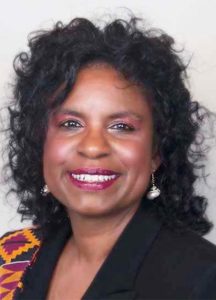Michael Carter, Jr. is a graduate of North Carolina Agricultural and Technical State University, the 2021 top-ranked Historically Black College and University (HBCU). He is the president of the Fredericksburg-Prince’s Town (Ghana) Sister City Association, the owner of Carter Farms (a centurion family business that grows seasonal African, Caribbean, and Asiatic tropical vegetables); and, he is a James Farmer Scholars legacy graduate, class of 1996.
When Michael was invited to apply for the James Farmer Scholars program in 1990, the 13-year-old had no idea who James Farmer was. He jokingly recalled thinking that the invitation was another one of the smart-people programs he was already in, so he didn’t give it much thought when he applied.
He and twelve other students from Caroline County were among the 200 students from Westmoreland, Spotsylvania, and Fredericksburg who were selected to participate in the six-year program hosted by Mary Washington College, now the University of Mary Washington.
Students were required to attend enrichment courses and other extra-curricular activities one Saturday per month for the academic school year. Students also had the opportunity to attend week-long summer sessions on campus while regular college students were away from school. Giving up one Saturday a month was a serious commitment for an adolescent. It was also a serious commitment for the teachers who agreed to work with the young scholars.
Michael recalled the comradery he shared with the new friends he made from other school districts but also the teachers who made unforgettable impressions on him, three in particular: Dr. Marci Catlett, S.J. Cordell-Robinson, and Mr. McKinney:
“What I really liked was being exposed to the cultural materials that I was not exposed to in school in Caroline County. I remember one time we had to recite poetry from Langston Hughes and I was so nervous. I had never cited poetry before and I had never spoken in front of other people…I didn’t even know who Langston Hughes was!… I will never forget the strong personalities of those teachers, Dr. Catlett, Ms. Robinson, and Mr. McKinney. They took a genuine interest in our growth and development as critical thinkers. I felt genuine love and passion for everything they said and did for me. For all of us. They were phenomenal.”
But there was more to the enrichment education program than reciting poetry. Michael said the program helped to build and groom respectable characteristics:
“The Program taught us how to live away from our parents; how to make good decisions in different environments without help or guidance from our parents like we would have to do in the real world. We had to figure out how to figure out—like finding our way around a college campus, using a map, or following others. We weren’t left to wander around missing class or anything like that, but we did have to be intentional about how we managed our time getting to and from classes across campus. So when I went away to college at A&T, I was already familiar with a college campus and I had six years of experiencing the self-governance skills of living away from my parents and making my own decisions, so I was comfortable.”
Classroom time was dedicated to specific subjects such as literature or math; race and racism were discussed openly with students outside of the classroom as would be expected in a program created to honor the social justice advocate.
Although Michael graduated from the JFS program in 1996 and began working toward his bachelor’s degree in Agricultural Economics at A&T, he did not forget the value the program added to his life. In fact, during two of his summer breaks home from college, he taught JFS summer enrichment courses. Michael repeated what he saw his teachers in the program do: reach back to pull forward.
In retrospect, Michael wished that he could have learned more about African American history in Fredericksburg and the surrounding areas while he was in the program. He also would have liked to have learned more about Dr. Farmer’s role in the Civil Rights Movement while Dr. Farmer was accessible on campus. But hindsight being what it is, Michael is immensely grateful to have at least been in the presence of all the giants and very proud to be a graduate of the James Farmer Scholars Program.
[1] Morgan v. Virginia, 328 U.S. 373 (1946)
📷: Michael Carter image – provided by Virginia Cooperative Extension
About James Farmer, Jr.
Dr. James Farmer, Jr. (1920-1999) was one of the “Big Six” leaders of the Civil Rights Movement from the 1940s to-1960s. A native of Marshall, Texas, Dr. Farmer co-founded the Congress of Racial Equality (CORE) in Chicago in 1942. Five years later, CORE organized the first Freedom Rides called The Journey of Reconciliation to test the June 3, 1946, Supreme Court ruling that declared discrimination in interstate commerce, illegal[1]. He worked alongside John Lewis, Asa Philip Randolph, Dr. Martin Luther King, Jr., Stokely Carmichael, and others and was instrumental in championing important Civil Rights legislation such as Voting Rights, desegregation of public schools, labor laws that prevented discrimination in the workplace, and other public spaces–all the things we might take for granted today.
Dr. Farmer was a history professor at the Mary Washington College from 1985 to 1998. While at Mary Washington College, the James Farmer Scholars program was established by school administrators to encourage African American students to apply for admission at the school. The program recruited African American students in the 7th -12th grades from Caroline, Fredericksburg, Spotsylvania, and Westmoreland counties who had the academic potential to succeed in college but not necessarily the financial means or support from home to do so.
He received 22 honorary doctorate degrees and was awarded the Medal of Freedom from former President Bill Clinton in 1998, the same year he retired as Distinguished College Professor of History and American Studies at Mary Washington College.
—————
About the Author: Paula D. Royster, PhD
 Dr. Royster is the Founder of The Center for African American Genealogical Research, Inc. (CAAGRI). She is a published author, and a two-time Fulbright Scholar grantee. Dr. Royster teaches undergraduate coursework in Humanities and Social Sciences. She earned her interdisciplinary doctorate degree in Humanities and Culture with a secondary major in Public Policy and Social Justice; and an advanced graduate certificate in Creative Writing. Her research interest is the African Diaspora.
Dr. Royster is the Founder of The Center for African American Genealogical Research, Inc. (CAAGRI). She is a published author, and a two-time Fulbright Scholar grantee. Dr. Royster teaches undergraduate coursework in Humanities and Social Sciences. She earned her interdisciplinary doctorate degree in Humanities and Culture with a secondary major in Public Policy and Social Justice; and an advanced graduate certificate in Creative Writing. Her research interest is the African Diaspora.

